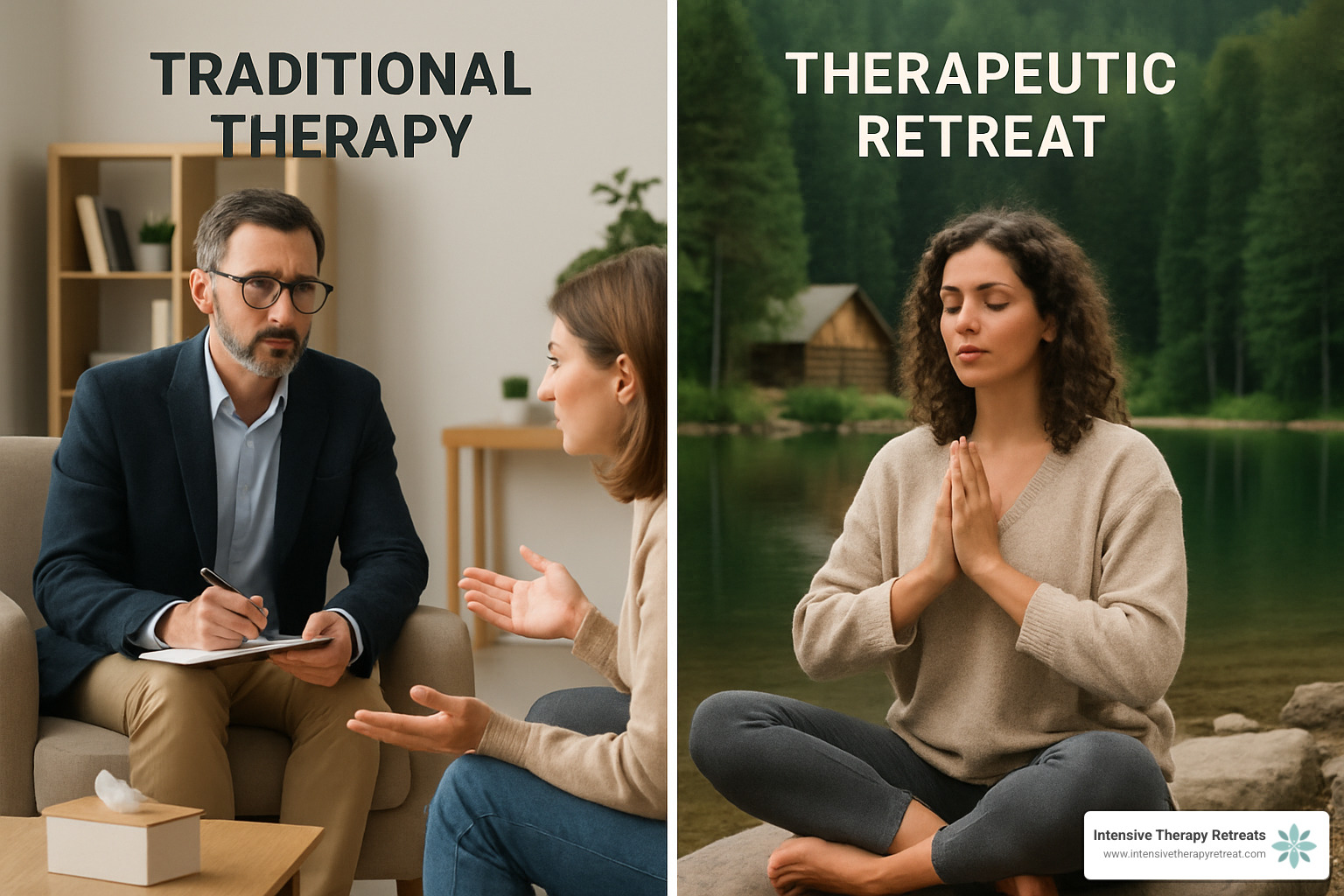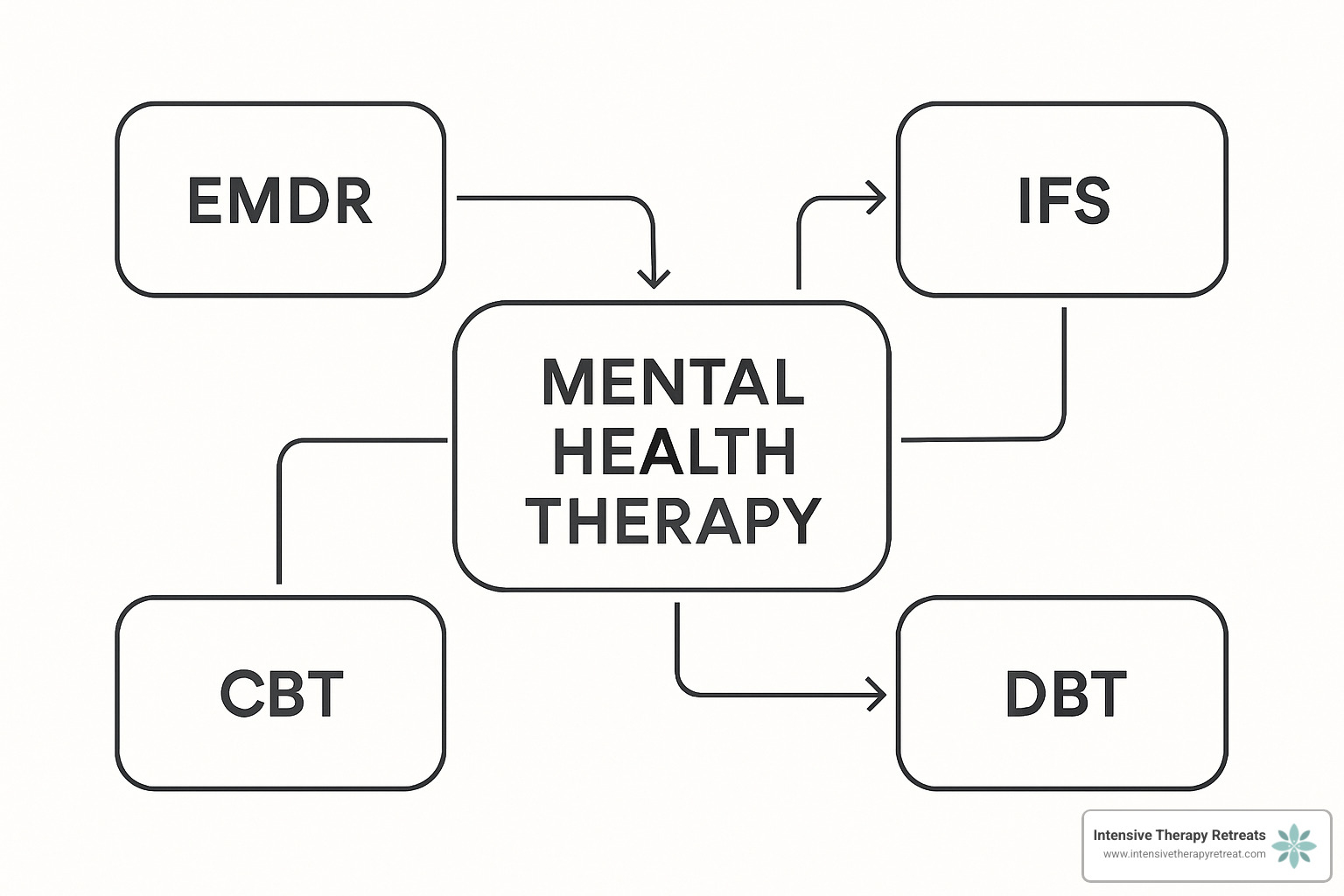Therapeutic Retreats: 7 Powerful Healing Benefits
Why Therapeutic Retreats Are Changing Mental Health Recovery
Therapeutic retreats compress months of progress into just a few days. By stepping away from everyday stressors, you can focus exclusively on healing with the support of a licensed clinician using proven, trauma-informed methods.
How retreats differ from a simple getaway
- 3–5 days of focused, one-on-one therapy (EMDR, IFS, ART)
- Private, trigger-free setting that encourages deep emotional work
- Immediate integration between sessions instead of week-long gaps
- Targeted help for trauma, PTSD, anxiety, depression, and relationship challenges
I’m Bambi Rattner, Psy.D. and after 35 years of practice, I’ve seen clients achieve life-changing breakthroughs in retreat settings that would normally take months of weekly sessions.
Similar topics to therapeutic retreats:
Reason 1: Achieve Profound Healing, Faster Than Traditional Therapy
Traditional weekly therapy often involves a stop-start rhythm; you make progress in a session, only to have a full week of life stressors interrupt the momentum. In a retreat, you spend multiple hours a day immersed in the therapeutic process. This continuity keeps insights fresh and pushes past the psychological defenses that can rebuild between weekly appointments. The result is an accelerated healing journey, with research on intensive formats showing results equal to months of outpatient work in as little as five days.
Why it works
- Continuous momentum: By eliminating long pauses, your brain remains in a therapeutic, processing state. This allows you to go deeper, faster, and build on breakthroughs from one session to the next without losing traction.
- Immediate therapist support: When difficult emotions or memories surface, your therapist is right there to help you steer and integrate them safely. This real-time support prevents you from feeling overwhelmed and turns challenging moments into powerful healing opportunities.
- Distraction-free environment: Being removed from daily responsibilities and digital noise allows your nervous system to settle. This quiet focus is essential for accessing deeper parts of the psyche and doing meaningful work.
- Lasting relief: The goal is not a temporary fix. The depth of work achieved in an intensive format leads to fundamental shifts in perspective and neural pathways. Many clients report significant symptom declines that hold up long-term at follow-up assessments.
Healing in days, not years · The unique advantages of intensive therapy retreats
Reason 2: Access a Powerful Toolkit of Evidence-Based Therapies
A retreat is like entering a well-stocked workshop: you and your therapist have the flexibility to choose the exact tool each moment requires, creating a truly customized healing experience.
- EMDR (Eye Movement Desensitization and Reprocessing) reprocesses disturbing memories using bilateral stimulation (like eye movements or tapping). This evidence-based, eight-phase approach helps the brain’s natural information processing system properly digest and store traumatic memories, reducing their emotional charge. Read more on Wikipedia.
- Internal Family Systems (IFS) helps you understand and harmonize the various “parts” inside you (e.g., an anxious part, a critical part). The goal is to access your core Self, which is inherently calm, curious, and compassionate, to heal these wounded parts.
- Accelerated Resolution Therapy (ART) uses visualization and a technique called Voluntary Memory/Image Replacement to rapidly reduce the sting of painful images and sensations. It is a more directive, procedural therapy that can bring relief from trauma symptoms in just a few sessions.
- Somatic approaches recognize that trauma is stored in the body. These methods help you tune into physical sensations to calm the body, release stored tension, and complete self-protective responses that were frozen during a traumatic event, so it no longer feels stuck in fight-or-flight.
Because all of these powerful modalities are available in one place, your therapist can fluidly integrate them. Your treatment plan isn’t rigid; it adjusts in real time to what you need most, ensuring the most effective path to healing.
Learn more about EMDR intensive therapy · The power of Internal Family Systems (IFS) to steer trauma · How Accelerated Resolution Therapy works · Tools to break the cycle of generational trauma
Reason 3: Find a Program Custom to Your Unique Journey
Therapeutic retreats are never one-size-fits-all. You may choose:
- A fully private one-on-one retreat for focused attention
- A couples retreat that heals personal and relationship wounds together
- A small group format that offers the reassurance of shared experience
Your therapist tailors the plan to your history, goals, pace, and comfort—whether you are working with PTSD, anxiety, grief, burnout, or relationship distress.
Who should attend therapy retreats · Information on couples therapy retreats
Reason 4: Immerse Yourself in a Restorative and Healing Environment
Setting matters profoundly in therapeutic work. Many retreats take place in tranquil natural locations—lakeside cabins, forest lodges, mountain hideaways—for a scientific reason. Exposure to nature has been shown to lower cortisol (a primary stress hormone), reduce blood pressure, and signal safety to the nervous system. This concept, known as biophilia, suggests we have an innate tendency to connect with nature. Disconnecting from the constant stimulation of phones, email, and household demands creates a crucial “pattern interrupt,” freeing up the mental and emotional space required for deep, lasting change.
This restorative environment extends beyond the therapy room. Outside of sessions, you may practice gentle yoga to reconnect with your body, mindfulness to cultivate present-moment awareness, or art to express feelings non-verbally. These holistic touches are not just pleasant activities; they are integral components that reinforce the clinical work. Enjoying nourishing, chef-prepared meals further supports your well-being, ensuring your brain and body have the fuel they need for the intensive healing process.
Explore our retreat locations · Find holistic mental health retreats
Reason 5: Address Deep-Rooted Trauma with Specialized Care
Deep-seated trauma, especially complex or developmental trauma, often requires more than standard talk therapy. While talking is important, trauma is not just a story stored in the mind; it’s a physiological imprint held in the nervous system. Retreats are built from the ground up for survivors, using approaches that work from the “bottom-up” (body to mind) as well as “top-down” (mind to body).
This specialized approach is rooted in several key principles:
- Trauma-Informed Clinicians: Therapists are expertly trained in trauma-informed care, which prioritizes your emotional and physical safety, choice, and collaboration. They understand the neurobiology of trauma and create a secure container for healing.
- Targeted Modalities: Therapies like EMDR, ART, and somatic work are specifically designed to let the brain finish processing overwhelming events that got stuck. They help move traumatic memories from a raw, emotionally charged state to a resolved, narrative form.
- Real-Time Response: In a retreat setting, triggers are not something to be discussed “next week.” They are met and soothed in real time with your therapist’s support, turning potential crises into opportunities for profound healing and resilience-building.
This intensive, specialized container provides the safety and tools needed to address core wounds. It often helps break painful generational cycles and offers a depth of relief that endures well beyond the retreat itself.
Our approach to intensive trauma therapy · Healing for sexual abuse survivors · Support for complex PTSD
Reason 6: Build Meaningful Connections and End Isolation
Trauma often leaves people feeling alone. Retreats offer two layers of connection:
- A deep, attuned relationship with your primary therapist
- When group elements are included, the healing power of “me too” moments with peers
Feeling genuinely seen and understood becomes a powerful corrective experience you can carry back into everyday life.
Healing bonds and overcoming trauma in relationships · Meet our team of dedicated therapists
Reason 7: Learn Sustainable Skills for Lifelong Wellness
An intensive therapy retreat is not about creating dependency on a therapist; it’s about empowering you for the rest of your life. Healing doesn’t end at checkout. Throughout your retreat, you’ll learn and master practical tools for emotional regulation and resilience until they become second nature. The goal is to internalize the therapist’s supportive voice and skills so you can become your own best resource.
These skills include:
- Grounding Techniques: Simple but powerful methods to anchor you in the present moment when you feel overwhelmed or dissociated, such as the 5-4-3-2-1 technique (naming five things you see, four you feel, etc.).
- Self-Compassion Practices: Learning to treat yourself with the same kindness you would offer a friend, based on principles of self-kindness, common humanity, and mindfulness.
- Nervous-System Regulation: Understanding your “window of tolerance” and using tools like specific breathing exercises to calm your fight-or-flight response or gently energize a freeze response.
- Healthy Communication: Developing the ability to express your needs and boundaries clearly and kindly, often using frameworks like “I-statements.”
Quality programs ensure this learning sticks by providing:
- Written, personalized integration plans
- Follow-up telehealth sessions or local referrals
- Resource libraries for continued practice
The ultimate goal is self-empowerment. You leave not just feeling better, but knowing exactly how to steer future challenges and keep your progress alive.
The transformative power of self-compassion · How to empower yourself after trauma
Choosing the Right Therapeutic Retreat: A Quick 4-Step Guide
- Clarify your goals. Identify the issues you want to address and the outcomes you hope for.
- Research programs. Check therapist credentials, modalities, format, and daily schedule.
- Review logistics. Compare locations, settings, costs, and insurance options.
- Ask about aftercare. Look for follow-up sessions and clear integration plans to cement lasting change.
Frequently Asked Questions
What is the main difference between a therapeutic retreat and a wellness retreat?
Therapeutic retreats provide licensed, evidence-based mental-health treatment; wellness retreats focus on relaxation activities like yoga or spa services.
How long are retreats?
Most intensive programs run 3–5 days; some extend to a full week, allowing you to accomplish months of progress quickly.
Can I attend if I’m already in weekly therapy?
Yes. Retreats complement ongoing therapy, and many clinicians recommend them. With your permission, retreat staff can coordinate care with your current therapist so integration is seamless.
Conclusion
As we’ve explored throughout this journey, therapeutic retreats offer a truly unique and deeply powerful path to mental health healing. They provide an immersive experience that goes beyond what traditional weekly therapy alone can achieve, helping you find profound, lasting change.
Imagine making years of progress in just days. That’s the heart of what makes therapeutic retreats so special. They offer accelerated healing within a focused, caring environment. You’re able to dive deep into core issues, receiving specialized care custom just for you. This intensive approach fosters breakthroughs that lead to genuine, lasting change.
Choosing to attend a therapeutic retreat is more than just a trip; it’s a significant investment in profound personal change. It’s a commitment to your well-being, paving the way for a life filled with greater peace, understanding, and resilience. Whether you’re navigating past trauma, seeking relief from anxiety or depression, or looking to strengthen your relationships, these retreats offer a concentrated space for healing.
At Intensive Therapy Retreats, we understand the desire for genuine change. That’s why we’re dedicated to providing personalized, one-on-one programs. Our approach is designed to create a year’s worth of healing in just days, utilizing proven modalities like EMDR, IFS, and ART. Our goal is to help you achieve the deep, breakthrough healing you’ve been searching for.
Healing is not just a dream; it’s entirely possible. And you don’t have to wait years to experience the relief and growth you truly deserve. Therapeutic retreats offer a direct path to rapid, lasting change, empowering you to reclaim your life and move forward with newfound confidence, strength, and hope.
If you’re ready to find if this transformative experience is right for you, we invite you to learn more about why an intensive mental health retreat could be your next step toward a brighter future.



